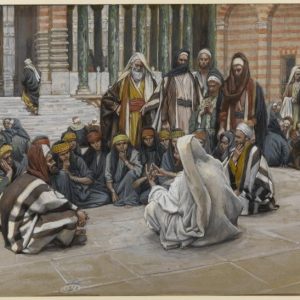 The Christian moral life is one that seeks to cultivate and practice virtue. According to the Catholic Catechism, “A virtue is an habitual and firm disposition to do the good. It allows the person not only to perform good acts, but to give the best of himself” (no. 1803). Virtues form our souls with the habits of mind and will that support good moral behavior, help us control of our passions, and help us avoid sin. Virtues like compassion, responsibility, honesty, courage, and persistence guide our conduct, leading us toward freedom and the good moral life.
The Christian moral life is one that seeks to cultivate and practice virtue. According to the Catholic Catechism, “A virtue is an habitual and firm disposition to do the good. It allows the person not only to perform good acts, but to give the best of himself” (no. 1803). Virtues form our souls with the habits of mind and will that support good moral behavior, help us control of our passions, and help us avoid sin. Virtues like compassion, responsibility, honesty, courage, and persistence guide our conduct, leading us toward freedom and the good moral life.
For the scribes and Pharisees of Jesus’ time (Matthew 5, 20-26), virtue was largely measured by external observance of the law. For Jesus, that was not enough. For Him, real virtue was in the human heart. For example, there was a commandment not to kill, but Jesus said that even hatred, anger, and violence in the heart (even sometimes expressed by abusive language) were to be avoided. Furthermore, His teaching was that we cannot have one set of relationships with God, and another set with people.
Jesus called (and continues to call) His disciples to go deeper! The renewal that this takes is not something we can bring about on our own. We need the Holy Spirit to work that kind of deep transformation within ourselves. A traditional prayer puts it very clearly: “Come Holy Spirit, fill our hearts, and kindle in us the fire of your love.” How can we not be drawn to such a prayer? It calls on the Holy Spirit to recreate deep within us the love that shaped the person of Jesus; it prays for the roots of that deeper virtue which is what God really wants for us.
***
Con frecuencia echamos la culpa a la comunidad y al “sistema” por los males de la sociedad y por los pecados que cometemos. Ese encogerse de hombros y no darle importancia a nuestra responsabilidad personal es un vicio “escapista” de siempre. Jesucristo lo abordó; y también los profetas antes que Él.
El profeta Ezequiel, por ejemplo, nos dice: “Ustedes son personalmente responsables por sus pecados y tienen que arrepentirse. Si así lo hacen, Dios los acogerá de nuevo en su amor.” Y Jesús nos dice: “Lo que cuenta no es la ley, sino la actitud personal y la intención de ustedes.” El verdadero culto a Dios no consiste en prácticas religiosas privadas y centradas en sí mismo, sino en estar comprometido y entregado como Cristo a la tarea de reconciliación y de servicio a los demás.
Recordemos para este día Cuaresmal y para los que siguen: la fraternidad es el valor primero para el discípulo de Jesús. Todo lo demás es secundario. Somos “pueblo perdonado” y, por lo tanto, tendríamos que ser, generosamente, “pueblo perdonador.” Que el Señor nos dé fuerza y entereza para ello.

